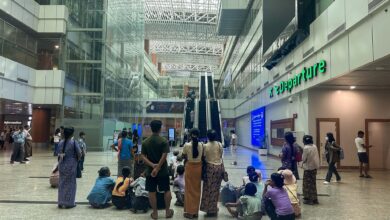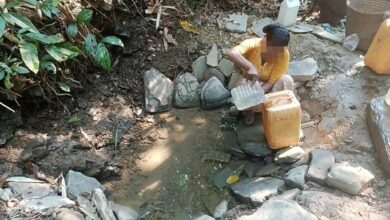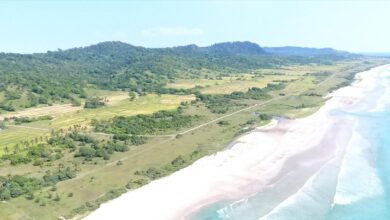
In February 2011, a month before he stepped down after nearly two decades in power, former dictator Than Shwe gave two of his five daughters a remarkable gift: a pristine beach in southern Myanmar’s Tanintharyi Region.
According to maps and other documents seen by Myanmar Now, the then-junta’s Forestry Ministry removed a 172-acre parcel of land from the Myaw Yit Nature Reserve Area, a protected zone in Launglon Township about 25km west of the regional capital Dawei, and handed it over to Win Hotel & Resorts Co., Ltd.
The directors of the company, which is headquartered in Yangon’s Hlaing Township, are Dewa Shwe and Thandar Shwe, Than Shwe’s second-eldest daughter and his youngest.
A decade earlier, the State Peace and Development Council (SPDC)—the military regime headed by Than Shwe—nationalised a total of 17,632 acres of land around the Myaw Yit Pagoda, ostensibly to protect it from development and preserve its natural diversity. The area encompasses a dozen villages, mostly in the Kyauk Sin village tract, and had been farmed by locals for generations.
Teeming with perennial plants such as durian, rubber, coconut, betel, jackfruit, and cashew, the lush green area also includes long stretches of white-sand beach along the Andaman Sea coast, and is a stunning example of the relatively unspoilt beauty of Myanmar’s far south.

The transfer of this property to Than Shwe’s daughters was orchestrated by the SPDC’s forestry minister, Brig-Gen Thein Aung, who went on to become chief minister of Ayeyarwady Region after retiring from the military to join the quasi-civilian administration of ex-general Thein Sein, whose Union Solidarity and Development Party (USDP) won the rigged election of 2010.
Still a member of the USDP’s central advisory committee, Thein Aung is also the father of Maj-Gen Zaw Hein, who was handpicked by Senior General Min Aung Hlaing, the leader of the current coup regime, to head the Naypyitaw Regional Military Command and later the Yangon Command.
No negotiation
The nearest village to the land acquired by Than Shwe’s daughters is Kan Pani. Like most others in the area, residents of this village of around 300 households live mainly by fishing, but some also do agricultural work. However, most farming has been forbidden within the Myaw Yit Nature Reserve Area since its creation in 2001, although many still live there and continue to pay tax on land formerly used to grow crops.
The first sign that someone was interested in acquiring the land that ultimately became the property of Win Hotel & Resorts came in 2010, according to Thein Soe, the man who served as Kyauk Sin’s village administrator at the time.
He recalled that some army officers came to view the coastline from boats, using binoculars to look up and down the length of the shore.
“A month later, two men came saying they wanted to buy this place. At the time, we were unaware of their connection to U Than Shwe,” the 45-year-old former administrator told Myanmar Now.

The two men, who turned out to be retired army officers, reportedly offered to pay between 200,000 and 600,000 kyat per acre for the land they wanted—an insignificant amount that was not open to negotiation.
“The locals had to give up their land for next to nothing. They were told that if they didn’t sell their land, it would be forcibly taken from them,” said Bo Htwe, who represented Launglon Township Constituency No 1 in Tanintharyi’s regional assembly from 2015 to 2020. Like other members of the ousted ruling party, the National League for Democracy, he was later forced to flee.
Soon after the land was sold, it was enclosed within a barbed-wire fence. However, 12 years after losing their property, locals say they have yet to see it being put to any use by its new owners.
Myanmar Now has made multiple attempts to contact Win Hotel & Resorts by telephone and email, but has not received any response to its requests for comment.
There were also no current administrators available to answer questions, as there are no longer any there due to the assassination of at least three junta-appointed officials in the area since the coup.

‘A kind of bullying’
Ensconced in his mansion in Naypyitaw’s Pobbathiri Township since stepping into the shadows more than a decade ago, Than Shwe is still an important presence in the city that he created and made Myanmar’s capital in 2005.
Carved out of the jungle west of Pyinmana, a large town in central Myanmar that served as the base of the Burma Independence Army during WWII, Naypyitaw is now replete with hotels, shopping centres, wholesale markets, and other businesses—many of them owned by Than Shwe’s family and associates.
Now in his 90s, Than Shwe rarely ventures from his home in Pobbathiri’s “Row of Six Mansions,” where he and other senior members of his regime reside in luxury and under heavy security. But his eight adult children—Htun Naing Shwe, Kyaing San Shwe, Thandar Shwe, Khin Pyone Shwe, Aye Aye Thin Shwe, Kyi Kyi Shwe, Dewa Shwe, and Thant Zaw Shwe—remain active in Naypyitaw and beyond.
In Pyinmana’s Oo Sin Yu Ward, near the Rose-shaped Roundabout on the Yangon-Mandalay Highway, are eight houses built in the same modern style. Constructed in 2010—one for each of Than Shwe’s children—they now sit empty, a testament to both the family’s extravagant wealth and its indifference to the communities that they routinely take over in their quest to claim as much of the country as they can as their own.

“It’s difficult to estimate what their total assets are,” said one Pyinmana resident, commenting on the family’s enormous economic footprint in the town.
“It’s a kind of bullying. They do this just because they can, as if it were their right. They don’t care about the local community,” he added.
Culture of corruption
Since seizing power in a coup just under a decade after Than Shwe’s retirement, Myanmar’s current dictator, Min Aung Hlaing, has emulated his predecessor not only in his brutality, but also in his expansive greed.

In fact, from the moment he took over from Than Shwe as commander-in-chief of the armed forces more than 12 years ago, Min Aung Hlaing has lived well beyond his means. His wife, Kyu Kyu Hla, is known to be an avid buyer of high-end fashion brands such as Louis Vuitton, making lavish purchases that would be impossible if she had to rely solely on her husband’s official salary.
His two adult children—son Aung Pyae Sone and daughter Khin Thiri Thet Mon—have also amassed considerable fortunes through their various business ventures, including hospitals, art galleries, and film production. As Myanmar’s economy continues its downward spiral in the wake of the military takeover, their business interests have only expanded.
It comes as no surprise, then, that a culture of corruption has taken hold within the regime, especially among those closest to Min Aung Hlaing.
Among the worst offenders has been Lt-Gen Moe Myint Tun, one of the junta chief’s most trusted disciples and the head of three key economic bodies—the Myanmar Investment Commission, the Foreign Exchange Supervisory Committee, and the Central Committee on Ensuring Smooth Flow of Trade and Goods.

Widely expected to become Min Aung Hlaing’s eventual successor, Moe Myint Tun has instead ended up in prison, serving a 20-year sentence along with his underling Brig-Gen Yan Naung Soe, due to their rampant abuse of power and unbridled corruption. Also facing intensifying scrutiny are Lt-Gen Soe Htut, who was forced to step down as home affairs minister in September, and deputy commerce minister Nyunt Aung, who has been implicated in Moe Myint Tun’s crooked operations.
By locking up a handful of his more egregiously greedy colleagues, Min Aung Hlaing may be hoping that he can clean up his own image in the eyes of the cronies that he depends on to keep his regime in power. However, it is unlikely that his superficial actions will have any impact on the economic decay that is part and parcel of military rule in Myanmar.
According to Zin Yaw, an army captain who defected after the coup to the country’s burgeoning resistance movement, corruption is a pervasive feature of army life, from top to bottom. Even if it got rid of Min Aung Hlaing as its thief-in-chief, the military would continue to be mostly self-serving, he said.
“Just as changing battalion commanders doesn’t improve anything in the field, having a new commander-in-chief in charge would not make any difference. The country would still be in turmoil—but they would keep on getting richer and richer,” said the 20-year veteran of Myanmar’s armed forces.



